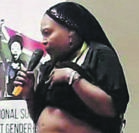
‘The extent of gender-based violence and femicide in South Africa renders it a national crisis.”
So, reads part of the national declaration from the Presidential Summit on Gender-Based Violence and Femicide.
The summit was convened by President Cyril Ramaphosa on November 1 and 2 in response to one of the demands made by #TheTotalShutdown movement against gender-based violence on August 1, when womxn marched to the Union Buildings in the month South Africa honours, or supposedly honours.
Notably, in his keynote address Ramaphosa demonstrated a level of political acknowledgment of “the crisis that is tearing our society apart”.
Finally. A political acknowledgement of the crisis levels of gender-based violence. It was the first time government publicly acknowledged it as such and it was long overdue.
But does this attest to the country’s readiness to deal with the horrors of gender-based violence?
Has government and our political leadership finally woken up to the reality of a crisis that needs urgent collective solutions to address gender-based violence?
For many years, civil society organisations and women’s rights groups have persistently made calls for government to deal with it as a matter of national priority; their cries have fallen on deaf ears.
Last year the Centre for the Study of Violence and Reconciliation published a research report titled Gender-based violence in South Africa: A Country in Crisis.
Despite the existing appalling statistics and damning evidence from women’s narratives pointing to this reality, the report was met with denialism and scepticism from government, with the then minister of women arguing it was a “challenge” and not necessarily a crisis.
The statistics speak for themselves.
Interpol’s comparative statistics worldwide suggest that in 2002 South Africa was ranked world number one in terms of reported gender-based violence cases.
Recent reports indicate this has not changed for the better as the recorded murder rate of 24.7 per 100 000 women in South Africa is the highest rate published.
The country’s femicide rate is also five times more than the global average, with three women reportedly dying at the hands of their intimate partners every day.
Notably, the Presidential Summit on Gender-Based Violence and Femicide brought about a much-needed ideological shift.
The acknowledgment of gender-based violence as a crisis demythologises and changes the script around the normalisation of gender-based violence in our society. It allows us to contend with the reality and cruelty of the direct pain of gender-based violence.
The harrowing stories and narratives from survivors on the first day of the summit demonstrated the levels of
pain women and gender non-conforming people in South Africa face.
Phindile narrated her gang rape by eight young men in Tembisa. She said to date, she’s had to undergo five surgeries on her stomach as a result of the attack.
In telling her experience, she lifted the lower part of her dress, exposing the scars resulting from the many operations she has had following the rape.
It was indeed a true act of feminist defiance, undergirded by the words “this is my body, my body that I didn’t want them to touch”.
At that moment Phindile did what needed to be done – to show the rawness of the painful consequences of gender-based violence.
To her life. And to her body. In so doing, she sent a clear message to those in the room.
That of the unwarranted burden and cost of gender-based violence to survivors. A clear message on how the judiciary and other systems designed to foster justice have vilified and failed the majority of women in this country.
A message I can only hope was well heard, understood and taken seriously.
In many ways, the summit clearly signalled the country’s commitment to strengthening its response to the crisis at the highest levels, as well as across all levels of government.
The national declaration clearly articulated a set of 17 commitments towards addressing gender-based violence, one of which includes immediately setting up an interim gender-based violence coordinating structure, which would be given the task of establishing a functional council within six months.
The president should champion it and adequate resourcing should be in place to ensure effective functioning.
These are much welcome developments, as they point to firm commitments around an integrated and adequately resourced national response towards addressing gender-based violence.
And as the president pledged to continue to listen and respond to the concerns of South African women, we need to hold him to his word.
We will measure his commitment not through the usual government events to commemorate 16 Days of Activism against gender-based violence, but in his next state of the nation address.
We will also monitor the coming national budget speeches.
If government has decided to listen and heed the call of women, how much of the state budget will be allocated towards addressing gender-based violence?
Will the recommendations from the national declaration be fully implemented?
Did the voices of survivors finally ring loud enough this time around?
Only time will tell.
Sibanda-Moyo is a gender specialist at the Centre for the Study of Violence and Reconciliation and the lead researcher and author of the recently published study titled: Violence against Women in South Africa: A Country in Crisis.
Follow her on Twitter @Nonhlanhla17




 Publications
Publications
 Partners
Partners








